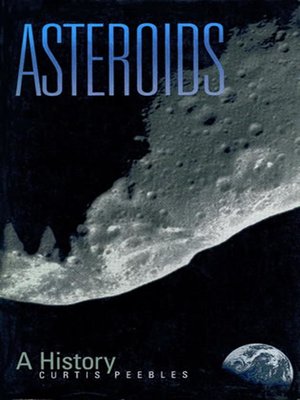
Sign up to save your library
With an OverDrive account, you can save your favorite libraries for at-a-glance information about availability. Find out more about OverDrive accounts.
Find this title in Libby, the library reading app by OverDrive.



Search for a digital library with this title
Title found at these libraries:
| Loading... |
Asteroids suggest images of a catastrophic impact with Earth, triggering infernos, tidal waves, famine, and death — but these scenarios have obscured the larger story of how asteroids have been discovered and studied. During the past two centuries, the quest for knowledge about asteroids has involved eminent scientists and amateur astronomers, patient research and sudden intuition, advanced technology and the simplest of telescopes, newspaper headlines and Cold War secrets. Today, researchers have named and identified the mineral composition of these objects. They range in size from 33 feet to 580 miles wide and most are found in a belt between the orbits of Mars and Jupiter.
Covering all aspects of asteroid investigation, Curtis Peebles shows how ideas about the orbiting boulders have evolved. He describes how such phenomena as the Moon's craters and dinosaur extinction were gradually, and by some scientists grudgingly, accepted as the results of asteroid impacts. He tells how a band of icy asteroids rimming the solar system, first proposed as a theory in the 1940s, was ignored for more than forty years until renewed interest and technological breakthroughs confirmed the existence of the Kuiper Belt. Peebles also chronicles the discovery of Shoemaker-Levy 9, a comet with twenty-two nuclei that crashed into Jupiter in 1994, releasing many times the energy of the world's nuclear arsenal.
Showing how asteroid research is increasingly collaborative, the book provides insights into the evolution of scientific ideas and the ebb and flow of scientific debate.
Covering all aspects of asteroid investigation, Curtis Peebles shows how ideas about the orbiting boulders have evolved. He describes how such phenomena as the Moon's craters and dinosaur extinction were gradually, and by some scientists grudgingly, accepted as the results of asteroid impacts. He tells how a band of icy asteroids rimming the solar system, first proposed as a theory in the 1940s, was ignored for more than forty years until renewed interest and technological breakthroughs confirmed the existence of the Kuiper Belt. Peebles also chronicles the discovery of Shoemaker-Levy 9, a comet with twenty-two nuclei that crashed into Jupiter in 1994, releasing many times the energy of the world's nuclear arsenal.
Showing how asteroid research is increasingly collaborative, the book provides insights into the evolution of scientific ideas and the ebb and flow of scientific debate.






